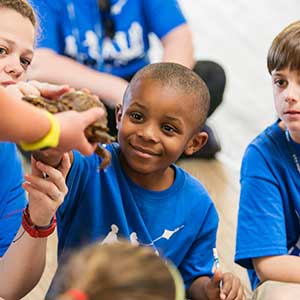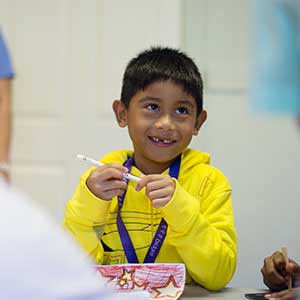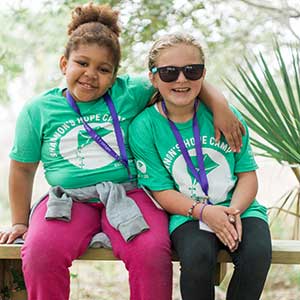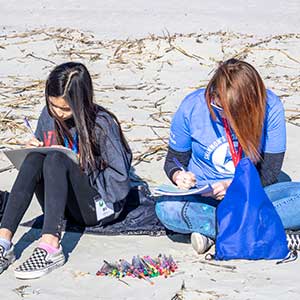Grief Education & Resources
We grieve together, we heal together, we grow together
Despite common perceptions, grief doesn’t follow any prescribed steps and it isn’t a process that is ever fully finished or completed. So, it’s normal for a child to experience grief in waves and to feel & express strong emotions – not just immediately after the death, but throughout their life. And it can be challenging for the caring adults in their life to know just what to do to help. Here are some important things to know about childhood bereavement. After reviewing the information below, please contact us if we can be of assistance to you or your family:
- Grief is a normal reaction to the death of someone significant (not a problem to be fixed)
- Every grief journey is unique – as unique to him/her as was their relationship with the deceased
- Children need accurate information about what happened and a safe space to express whatever they are feeling – no matter how messy or complicated
- Children often feel alone and misunderstood
- Children report that it helps to spend time with other kids who “get it” because they’ve also experienced the death of a significant person
- Grief changes as a child ages & reaches new development stages
- Children often experience personal growth as a result of their loss
Typical Grief Reactions by Age

Before Age 4
They do not understand the finality of death so they believe death can be reversed. They can sense the stress of others & are often concerned about their own security.

4-9 years old
They do not typically have a full understanding of the finality of death & rarely express emotions through words. Instead, they often ask lots of questions & tend to express emotions through play. They often engage in “magical thinking” about the death including feelings of guilt or responsibility for the death in some way. (“if I had just…”)

9-12 years old
They begin to understand the finality of death. They may be curious about the specific circumstances & details of the death. They may still struggle to find the words to express their feelings. They often start to become concerned about others’ reactions.

12-20 years old
They understand both the finality of death as well as the basics of how the body dies (heart, brain, breathing stop.) They may start searching for the meaning of death – and life. They typically seek support from peers more than adults and more frequently use words to express emotions. They may act out with risky behaviors.
Supporting Grieving Children
When someone we love dies, it can be difficult to comprehend, cope, and continue forward in life. The complicated emotions that arise can be intense and confusing to wade through. And as a child, it can be particularly overwhelming. So when supporting a child, try to let go of your expectations so you can create a safe space for your child to grieve fully, in their own way. Here are a few suggestions that you may find helpful.

Listen to Your Child
Let them safely express their emotions, frustrations, fears, and anxieties. Let them know that a range of different emotions is normal. Sometimes children express their grief through anger or fear, and it is important to allow the child to express their grief in their own way.

Use Direct Language
When talking to your child about death and grief the use of figurative language (“Grandma is sleeping now”) can be confusing and possibly encourage them to believe the person will wake up or return. It may feel uncomfortable at first, but try saying the “d” words – death, died – rather than softer words like “passed” or “transitioned.”

Encourage Them to Find Healthy Outlets to Cope With Strong Emotions
Try some of these activities with your children: meditating, taking breaks, exercising, painting, journaling, or listening to music.

Take care of yourself first
To best support your child, you need to take care of yourself. By practicing healthy coping skills and making time for self-care, you not only improve your capacity for supporting your child but also are modeling for them what healthy grieving and good self-care look like.

Ride the Waves Together
Unfortunately, you can’t fix the situation or protect them from the hard stuff. They will have good days and bad days. What you can do is allow your child to grieve whenever & however they need to and reassure them that you are there for them no matter what.

Create Ways to Remember Your Loved One
Rituals can keep your connection strong with your loved one. Try these activities: make a scrapbook, visit your loved one’s grave, plant something in his/her honor, keep celebrating their birthday, continue their favorite traditions during holiday celebrations.
National Alliance for Grieving (NAGC) – NAGC raises awareness about the needs of children and teens who are grieving a death and provides education and resources for anyone who supports them.
The Dougy Center – Dougy Center is a pioneer & leader in childhood bereavement and has a wealth of resources for children, teens, young adults, and adults.
What’s Your Grief (WYG) – WYG is a creative & candid source of grief education for adults and how they can support children and teens.
Sesame Street in Communities – These resources help kids (and parents!) with what matters most in young lives: health and wellness, social-emotional skills, and school readiness. All are critical to children’s healthy development…and together they build the foundation for a happy, healthy life.
First Book Marketplace for Grief, Loss & Healing – Curated list of 100+ books for elementary, middle & high school students
Scholastic Resources – Grief resources for children, teens, parents/guardians, & teachers. It includes kid-centric online resources, supportive adult online resources, online support groups, and booklists for teens, children, teachers, and supportive adults.
Recommended Books
Young Children
When Families Grieve – Sesame Street
Sun Kisses Moon Hugs – Susan Schaefer Bernardo
When Someone Dies: A Child-Caregiver Activity Book – National Alliance for Grieving Children
School Age Children
When Someone Very Special Dies: Children Can Learn to Cope with Grief – Marge Heegaard
The Memory Box (& Activity Book) – Joanna Rowland
Tear Soup – Pat Schwiebert and Chuck DeKlyen
One Wave at a Time – Holly Thompson
Turned Upside Down – Teana Tache
Finding Your Own Way to Grieve: A Creative Activity Workbook for Kids & Teens on the Autism Spectrum – Karla Helbert
Draw it Out – Steffanie Lorig & Rosalie Frankel
Teens
Chill & Spill – Steffanie Lorig & Jeanean Jacobs
Weird is Normal – Jenny Lee Wheeler
The Grieving Teen – Helen Fitzgerald
The Mindfulness Journal for Teens – Jennie Marie Battistin
You Are Not Alone: Stories by Young Teens who have Experienced the Death of a Sibling – Brooke’s Place, Dianne Martin
Parents
ABC’S for Healthy Grieving – Harold Ivan Smith
A Parent’s Guide to Raising Grieving Children – Phyllis R. Silverman and Madelyn Kelly
What Do We Tell the Children – Joseph M. Primo
It’s Ok that You’re Not Ok – Megan Devine
Professionals
Understanding & Supporting Bereaved Children: A Practical Guide for Professionals – Andy McNeil, Pamela Gabbay
The Grieving Student – David J. Schonfeld & Marcia Quackenbush
Helping Bereaved Children – Nancy Boyd Webb
Children and Grief when a Parent Dies – J. William Worden
Other Great Resources
The Wild Edge of Sorrow – Frances Weller
The Art of Losing: Poems of Grief & Healing – Kevin Young
Modern Loss: Candid Conversation about Grief. Beginners Welcome – Rebecca Soffer & Gabrielle Birkner
Stuck for Words: What to Say to Someone Who is Grieving – Doris Zagdanski
Our Offerings
In addition to our Stepping Stones Grief Support Program, Bridges of Hope offers community education and professional workshop opportunities for helping professionals and community members who support children who may experience grief. Our workshops can cover a wide range of topics, including the basics of grief, childhood grief & how it differs from adult grief & practical ways to support children who are grieving. The duration of these workshops can range from a short introduction of our programs to full-day workshops for professionals (CE maybe available). Please reach out to us to schedule a workshop or presentation for your group. Workshops and presentations are available for a variety of groups:
Youth serving organizations
School personnel
Parents
Faith-based leaders or communities
Medical personnel
Social workers & chaplains
Let’s Stay Connected
Stay up to date with our latest news and programs.
